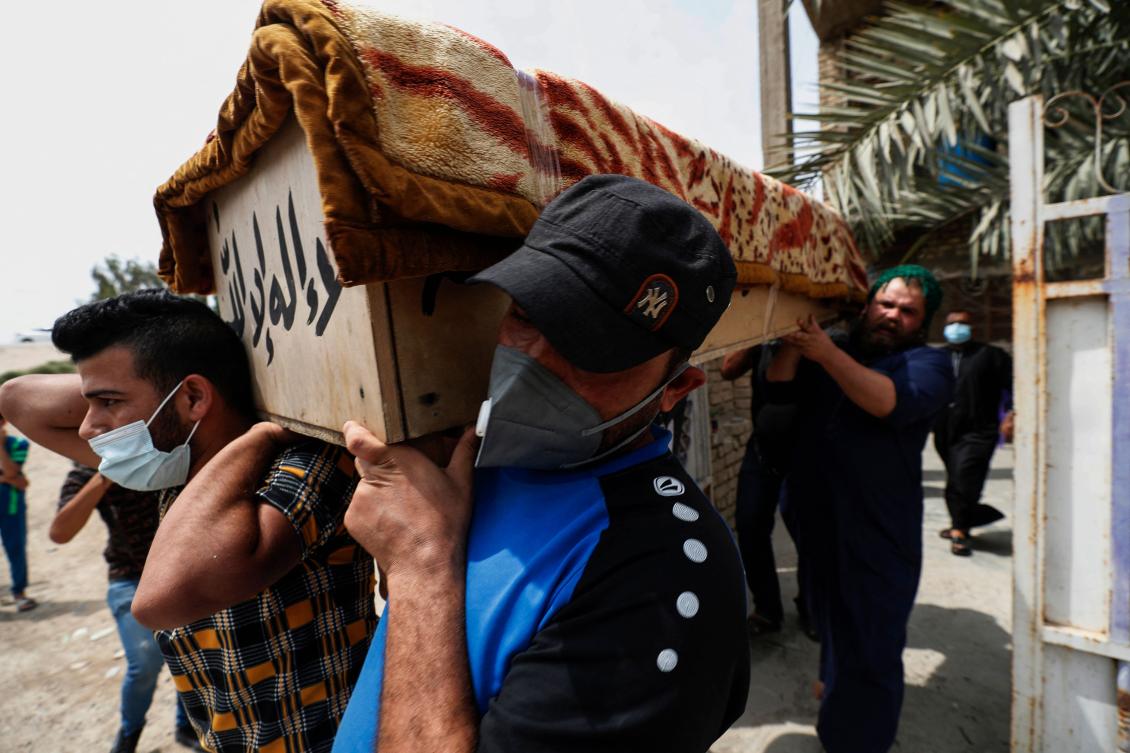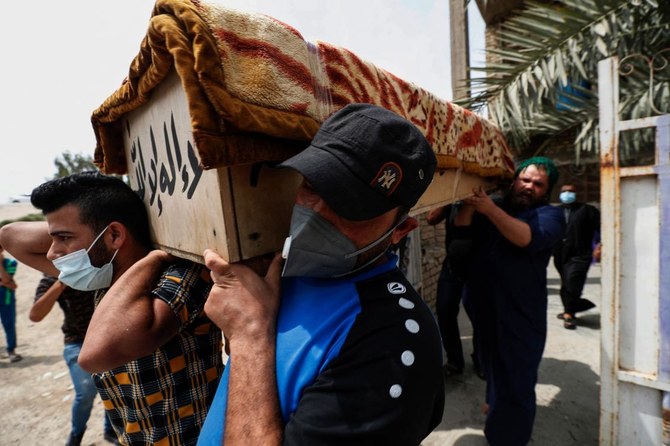BAGHDAD / JEDDAH: Iraq erupted in anger on Sunday after at least 82 people died and 110 were injured in a fire caused by an oxygen tank explosion at a COVID-19 hospital in Baghdad.
Prime Minister Mustafa Al-Kadhimi said there was “evidence of negligence” and suspended Health Minister Hassan Al-Tamimi pending an investigation.
The deadly inferno broke out overnight Sunday at Baghdad’s Ibn Al-Khatib hospital, blamed on poorly stored oxygen cylinders.
An official with the Iraqi Human Rights Commission said 28 of those killed were patients who were taken off critical ventilators to escape the flames.
The evacuation was slow, painful and chaotic, with patients and their relatives crammed into stairwells as they scrambled for exits.

The fire killed 82 people pre-dawn, sparking angry calls for officials to be sacked in a country with long-dilapidated health infrastructure. (AFP)
President Barham Saleh said the fire was “the result of years of erosion of state institutions by corruption and mismanagement.” The Iraqi Human Rights Commission denounced a “crime against patients exhausted by COVID-19 who put their lives in the hands of the Health Ministry and its institutions. Instead of being treated, they perished in flames.”
Many of the victims were on respirators and were suffocated or burned in the smoke and flames when the blaze began with an explosion caused by “a fault in the storage of oxygen cylinders,” health officials said.
Security forces on Sunday cordoned off the Ibn Al-Khatib Hospital, in the Diyala Bridge area of the Iraqi capital, and rescuers combed the smoke-blackened building as charred debris and shattered glass littered the ground outside.
As the flames spread, relatives scrambled to save loved ones, and some patients jumped to safety.
“I carried my brother out to the street. Then I came back and went up to the last floor that wasn’t burning. I found a girl suffocating, about 19 years old ... she was about to die,” rescuer Ahmed Zaki said.
“I took her on my shoulders and I ran down ... Doctors jumped on to the cars. Everyone was jumping. And I kept going up from there, got people and came down again.”
The blaze spread quickly across several floors while dozens of relatives were at the bedsides of the 30 patients in the hospital’s intensive care unit, where the most severe COVID-19 cases were treated.
Bakr Qazem, son of one the victims, was at the hospital when he felt “a strong explosion.”
He said: “We saw the fire but we were not able to save the patients.”
Another witness, Mohammed Ali, 23, a student who lost his uncle, said: “As soon as you arrived at the main entrance, it was suffocating. No one could climb upstairs. The whole hospital was gutted, all burnt down.”
One of the victims, Ali Ibrahim, 52, had been treated for coronavirus at the hospital. His family buried his body on Sunday.
“He had spent 12 days in hospital and was due to be discharged on Saturday evening after recovering. He was just waiting for the result of the last COVID-19 test,” one of his relatives said.
An emergency Cabinet meeting called by Al-Kadhimi ordered an investigation with findings due in five days.
“Such an incident is evidence of negligence and therefore I directed that an investigation be launched immediately,” the prime minister said.
The governor of Baghdad and another senior Health Ministry official were also suspended and referred to investigators, and the hospital’s manager and heads of security and maintenance had been detained, he said.
The fire triggered outrage on social media, with a hashtag demanding the health minister be sacked. A doctor at the hospital said that “in the whole Covid intensive care unit, there were no emergency exits or fire prevention systems.”
Witnesses and doctors told AFP many bodies had yet to be identified, the remains too charred by the intense flames.
These issues were raised in a 2017 public report on the Iraqi health sector, exhumed overnight in the wake of the fire by the country’s human rights commission.
“It’s mismanagement that killed these people,” the doctor added, who, on condition of anonymity, angrily listed the hospital’s many shortcomings.
“Managers walk around smoking in the hospital where oxygen cylinders are stored,” he said. “Even in intensive care, there are always two or three friends or relatives at a patient’s bedside.”
And, he added, “this doesn’t just happen at Ibn Al-Khatib, it’s like this in all the public hospitals.”
“When equipment breaks down, our director tells us not to report it,” said a nurse, in another hospital in Baghdad.
“He says it would give a bad image of his establishment, but in reality, we have nothing that works.”
Al-Kadhimi declared three days of national mourning, and parliament will devote its Monday session to the tragedy.
(With AFP)















